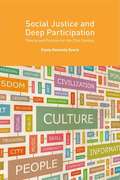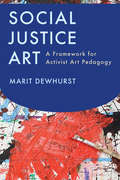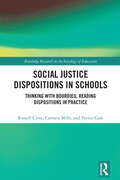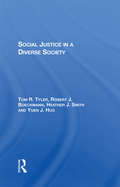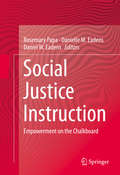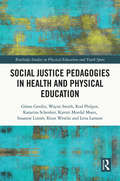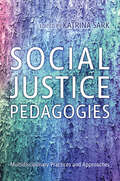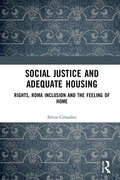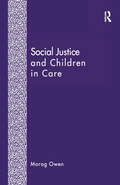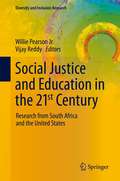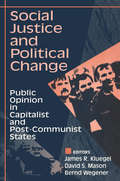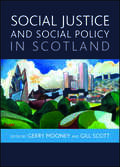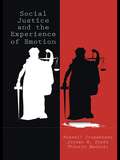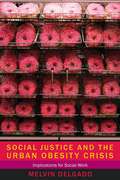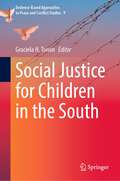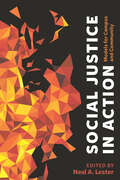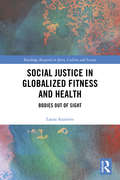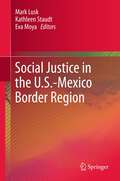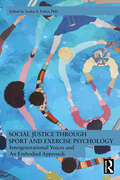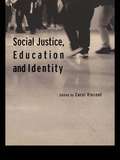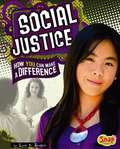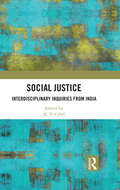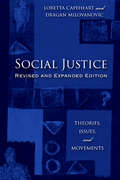- Table View
- List View
Social Justice And Deep Participation
by Paula Donnelly RoarkKnowing what deep participation is, and how it works, can make a critical difference in solving 21st century economic, political, and social problems. This book provides a new approach to hands-on change and begins formulation of a participatory social theory promising greater prosperity and justice for all.
Social Justice Art: A Framework for Activist Art Pedagogy
by Marit DewhurstIn this lively and groundbreaking book, arts educator Marit Dewhurst examines why art is an effective way to engage students in thinking about the role they might play in addressing social injustice. Based on interviews and observations of sixteen high schoolers participating in an activist arts class at a New York City museum, Dewhurst identifies three learning processes common to the act of creating art that have an impact on social justice: connecting, questioning, and translating. Noting that "one of the challenges of social justice art education has been the difficulty of naming effective strategies that can be used across multiple contexts," Dewhurst outlines core strategies for an "activist arts pedagogy" and offers concrete suggestions for educators seeking to incorporate activist art projects inside or outside formal school settings. Social Justice Art seeks to give common language to educators and others who are looking to expand and refine their practices in an emerging field, whether they work in art education, social justice programming, or youth development. "In a voice that is at once intimate and rigorous, subtle and discerning, skeptical and celebratory, Marit Dewhurst probes the layers and boundaries of what she calls the 'pedagogy of activist art.' Her voice plays in duet with those of the young artists whose discourses offer resistance and critique, insight and transparency, into the prevailing inequalities and injustices that divide and oppress their communities. Social Justice Art is a beautifully composed work of witness and wisdom, a practical and inspiring guide for practitioners, and an advance in theory and methodological innovation for researchers." --Sarah Lawrence-Lightfoot, Emily Hargroves Fisher Professor of Education, Harvard University, and author of The Essential Conversation
Social Justice Art: A Framework for Activist Art Pedagogy
by Marit DewhurstIn this lively and groundbreaking book, arts educator Marit Dewhurst examines why art is an effective way to engage students in thinking about the role they might play in addressing social injustice. Based on interviews and observations of sixteen high schoolers participating in an activist arts class at a New York City museum, Dewhurst identifies three learning processes common to the act of creating art that have an impact on social justice: connecting, questioning, and translating. Noting that &“one of the challenges of social justice art education has been the difficulty of naming effective strategies that can be used across multiple contexts,&” Dewhurst outlines core strategies for an &“activist arts pedagogy&” and offers concrete suggestions for educators seeking to incorporate activist art projects inside or outside formal school settings.Social Justice Art seeks to give common language to educators and others who are looking to expand and refine their practices in an emerging field, whether they work in art education, social justice programming, or youth development.
Social Justice Dispositions in Schools: Thinking with Bourdieu, Reading Dispositions in Practice (Routledge Research in the Sociology of Education)
by Carmen Mills Trevor Gale Russell CrossAgainst the backdrop of equity-sensitive approaches within education policy and practice, inequalities in student attainment remain a persistent problem. In response, this book advances the concept of social justice dispositions (SJDs), offering a new perspective by shifting the focus to what operates between the values and beliefs of policymakers and educators and the actual everyday practice evident within classrooms.In this intermediary space between belief and practice, this book conceives of social justice dispositions being one part of a larger collection of dispositions that constitute one’s habitus, drawing from the work of French sociologist Pierre Bourdieu. Bringing this together with methodological insights from cultural-historical activity theory, the authors seek to identify a spectrum of social justice dispositions that influence the pedagogic work of schooling—dispositions evident both in the pedagogic authority of school leadership and in the pedagogic action of classroom teachers.The book contributes new lines of inquiry, conceptual tools, and novel methodological approaches to advance social justice research and outcomes in education. As such, it is essential reading for academics, scholars, and postgraduate researchers working in the space of critical research and sociology of education.
Social Justice In A Diverse Society
by Tom Tyler Robert J Boeckmann Heather J Smith Yuen J HuoIssues of social justice have been an important part of social psychology since the explosion of psychological research that occurred during and after World War II. At that time, psychologists began to move away from earlier theories that paid little attention to people's subjective understanding of the world. As increasing attention was paid to people's thoughts about their social experiences, it was discovered that people are strongly affected by their assessments of what is just or fair in their dealings with others. This recognition has led to a broad range of studies exploring what people mean by justice and how it influences their thoughts, feelings, and behaviors.
Social Justice Instruction
by Rosemary Papa Danielle M. Eadens Daniel W. EadensThis resource offers instructors a full palette of strategies for teaching social justice concepts across subject areas from kindergarten through college. Dividing its content between elementary, adolescent, and adult learners, the book analyzes the classroom experience as a powerful means of challenging stereotypes and supporting inclusion, respect, and equity. History, language arts, literature, and social studies, as well as mathematics and science are shown as platforms for tying critical thinking to moral behavior. And while professional development underlies all chapters in the text, special areas such as technology, curriculum design, recognizing student demographics, and raising social justice awareness in school culture are spotlighted. Among the topics covered: Reframing social justice for the adult learner. The politics of "being": faculty of color teaching social justice in the college classroom. Stories of social justice from the kindergarten classroom. Critical literacy and multicultural literature. The shaming: creating a curriculum that promotes socially-responsible online engagement. Literacy is a civil write: the art, science, and soul of transformative classrooms. For educators and education researchers involved in the field, Social Justice Instruction unlocks the potential for imparting progressive ideas along the educational spectrum. The strategies here model a humanist perspective that will serve learners both in and outside the classroom.
Social Justice Pedagogies in Health and Physical Education (Routledge Studies in Physical Education and Youth Sport)
by Katarina Schenker Göran Gerdin Wayne Smith Rod Philpot Kjersti Mordal Moen Susanne Linnér Knut Westlie Lena LarssonThis book makes the case that school Health and Physical Education (HPE) can make a unique contribution to young people’s physical, emotional and social health outcomes when teachers of HPE engage in pedagogies for social justice that emphasise inclusion, democracy and equity. Drawing on observations and teacher interviews across Sweden, Norway and New Zealand, the book explores successful school teaching practices that promote social justice and equitable health outcomes. In particular, it draws attention to the importance of building relationships, teaching for social cohesion and explicitly teaching about and acting on social inequities as pedagogies for social justice. The book also argues that context matters and that pedagogies for social justice need to recognise how both approaches to, and focus on, social justice vary in different contexts. This is essential reading for academics and students interested in social justice and working in the fields of education, HPE and teacher education.
Social Justice Pedagogies: Multidisciplinary Practices and Approaches
by Katrina SarkSocial Justice Pedagogies provides a diverse and wide perspective into making education more robust and useful in light of global injustices and new challenges posed by new media and communication practices, media manipulation, right-wing populism, climate crisis, and intersectional discriminations. Meant to inspire readers to see learning and teaching from a wider perspective of justice, inclusion, equity, and creativity, it argues that relational and mindful approaches to teaching and learning in specific contexts, settings, and place-based experiences are essential in how we determine the value of education. The book draws on contributions from scholars and experts who incorporate social justice into their teaching practices in different disciplines in universities across Canada, the US, and Europe. Social Justice Pedagogies uniquely presents a wide interdisciplinary perspective on social justice in education practices in order to speak to the ways in which we all want to make our research, our classrooms, and our institutions more just. It argues that pedagogy, and specifically teaching and learning, constitutes a process of building relationships between people and knowledge by fostering a learning community.
Social Justice and Adequate Housing: Rights, Roma Inclusion and the Feeling of Home
by Silvia CittadiniThis book presents a critical analysis of the concept of ‘adequate housing’. While the concept of adequate housing is used largely as a normative standard in the protection of housing rights and in the implementation of housing policies, its apparent objectivity and universality have never been questioned by political and legal theory. This book analyses and challenges the understanding of this term in law and politics by investigating its relationship with the idea of ‘home’. ‘It is necessary to provide them with adequate housing!’ It is very common to hear this phrase when dealing with housing poverty, especially in relation to migrants, minorities, indigenous and other subaltern groups are concerned. But what does "adequate housing" mean? This book tackles this issue by proposing a critical analysis of this concept and of its use in the development of housing policies addressing the subaltern group par excellence in Europe, Roma. In so doing, it focuses on the lives of Roma and Sinti in Italy who have been the target of inclusion policies. Highlighting the emotional connection to housing, and dismantling some of the most ‘common sense’ ideas about Roma, it offers a radical revision of how social justice in the housing sector might be refigured. This book will be invaluable for scholars and students working on relevant themes in socio and critical legal studies, sociology, human rights, urban studies, human geography and Romani studies
Social Justice and Children in Care
by Morag OwenCan justice be achieved in voluntary cases - or is it purely a matter for courts to determine? Using a multi-disciplinary framework, which has at its centre a philosophical/anthropological view of social work as a moral practice, the author explores the notion of justice in public child care. The problem of parents’ and children’s rights is addressed, first of all in the legal context of care proceedings and then in the social work setting of voluntary care. Forty-six difficult cases are examined to see how decisions are made and implemented. In the final analysis the dimensions of social and legal justice are charted in a way which may contribute to general understanding of these issues and some suggestions are offered about how social work may move forward in response to legitimate criticism.
Social Justice and Education in the 21st Century: Research from South Africa and the United States (Diversity and Inclusion Research)
by Vijay Reddy Willie Pearson Jr.The world is not an equal place. There are high- and low-income countries and high- and low-income households. For each group, there are differential educational opportunities, leading to differential educational outcomes and differential labor market opportunities. This pattern often reproduces the privileges and inequalities of groups in a society. This book explores this differentiation in education from a social justice lens. Comparing the United States and South Africa, this book analyzes each country’s developmental thinking on education, from human capital and human rights approaches, in both primary and higher education. The enclosed contributions draw from different disciplines including legal studies, sociology, psychology, computer science and public policy.
Social Justice and Political Change: Public Opinion in Capitalist and Post-communist States (Gesellschaften Im Wandel / Societies In Transition Ser. #3)
by David S. Mason James R. Kluegel Bernd WegenerAnalysis and debate about economic and political justice rarely involves research on the views of the common person. Scholars often make assumptions about what common people think is fair, but for the most part they confine their thinking to a single country and argue on rational or moral grounds, with little supporting empirical data. Social Justice and Political Change, involves the collaboration of thirty social scientists in twelve countries, and represents broad-ranging comparative research. The book grows out of a collaborative study of public opinion about social justice. Though conceived prior to the revolutions that swept Central and Eastern Europe in 1989, the ISJP did not put its survey into the field until the summer of 1991, in a new climate of open international exchange in social research. Employing common methods of data collection and, within the limits of translation, identical survey instruments, the ISJP investigated public opinion in seven newly emerging post-Communist countries and five of the worldi?1/2s most influential capitalist democracies, with special sensitivity to divergencies in the newly united Germany. Among the themes addressed by the volumei?1/2s distinguished contributors are the views and beliefs of citizens in the post-Communist states on the transition to market economies and parliamentary democracy; the role of ideology in legitimating inequality; the structural determination of beliefs about justice; the processes that shape individual level evaluations; and the major implications of public opinion and mass participation in the democratic process.
Social Justice and Social Policy in Scotland
by Gerry Mooney Gill ScottSocial justice and social policy in Scotland offers a critical engagement with the state of social policy in one of the devolved nations of the UK, a decade after the introduction of devolution. Promoting greater social justice has been held up as a key vision of successive Scottish administrations since devolution began. It is argued throughout this important book that the analysis of Scottish social policy must therefore be located in wider debates around social injustice as well as about how the devolution process affects the making, implementation and impact of social policy. Social justice and social policy in Scotland focuses on a diverse range of topics and issues, including income inequalities, work and welfare, criminal justice, housing, education, health and poverty, each reflecting the themes of social inequality and social justice. This book will be essential reading for academics, researchers, policy makers and practitioners as well as students of social policy and of society in Scotland and other devolved nations.
Social Justice and the Experience of Emotion
by Russell Cropanzano Jordan H. Stein Thierry NadisicThis book seeks to integrate the scholarship on justice and affect. The authors focus on empirical social scientific theories pertaining to fairness, mood and emotion. Most of the literature in this book is drawn from social and organizational psychology. Other areas included are management, personality and evolutionary psychology. The book includes coverage of relevant philosophical positions from Aristotle and Rawls. The goal of this book is to familiarize the reader with the rich tradition of conceptual models explaining the association between justice and emotion. It will be of interest to graduate students, researchers and practitioners in industrial organizational psychology, social psychology, management and business ethics.
Social Justice and the Urban Obesity Crisis: Implications for Social Work
by Melvin DelgadoA number of economic, cultural, and contextual factors are driving urban America's obesity crisis, which can create chronic health conditions for those least able to manage them. Considering urban obesity through a social justice lens, this book is the first to help social workers and others develop targeted interventions for effective outcomes. The text dissects the problem of urban obesity in populations of color from individual, family, group, community, and policy perspectives. Beginning with a historical survey of urban obesity in communities of color, anti-obesity policies and programs, and the role of social work in addressing this threat, the volume follows with an analysis of the social, ecological, environmental, and spatial aggravators of urban obesity, such as the food industry's advertising strategies, which promote unhealthy choices; the failure of local markets to provide good food options; the lack of safe exercise spaces; and the paucity of heath education. Melvin Delgado reviews recent national obesity statistics; explores the connection between food stamps and obesity; and reveals the financial and social consequences of the epidemic for society as a whole. He concludes with recommendations for effective health promotion programs, such as youth-focused interventions, community gardens, and community-based food initiatives, and a unique consideration of urban obesity in relation to acts of genocide and national defense.
Social Justice for Children in the South (Evidence-Based Approaches to Peace and Conflict Studies #9)
by Graciela H. TononThis book considers that contextual factors are important for the achievement of social justice and it recognizes that vulnerability to which children are exposed is a phenomenon throughout the planet, particularly in the South. It presents a theoretical review of social justice as well as different situations of vulnerability children experience in their daily lives in which they can be injured, affecting their well-being and the exercise of their rights. It examines the impact of the COVID-19 pandemic on children, considered as a vulnerable group warranting special social policy considerations. It also presents the need to change power structures in knowledge production and decision-making processes to achieve social justice for children; the importance of investing in children; the exclusion of children from participation in certain activities and the shame of not being able to participate in equal conditions with others; the lives of migrant children belonging to ethnic minorities exposed to language barriers and access to technological devices; and the analysis of the process of social re-integration of children from conditions of armed conflict. The book concludes that governments need to assume social justice as part of universal human interests, providing security, conditions for well-being, and guaranteeing social justice for all children.
Social Justice in Action: Models for Campus and Community
by Neal A. LesterAddressing both veterans of justice work and novices seeking points of entry, the essays in this volume showcase practical approaches to diversity, equity, and inclusion: ways to build community, earn trust, tell unheard stories, and develop solutions to problems. Emphasizing values such as empathy, self-reflection, and integrity, the volume is rooted in humanities work but also features contributions from fields as diverse as the performing arts, architecture, and evolutionary biology and represents settings beyond the college campus, such as schools, libraries, museums, and prisons. While bringing insights from higher education, it critiques the system as well, exploring the ways that institutions reinforce power structures and exclude marginalized voices. Interspersed with the essays, brief reflections by activists and artists offer testimony and inspiration.
Social Justice in Globalized Fitness and Health: Bodies Out of Sight (Routledge Research in Sport, Culture and Society)
by Laura AzzaritoIn today’s neoliberal times, thinking about fitness and health is dominated by the media’s narratives of "fit bodies," which are presented and circulated in society as "valued bodies." Outside that mainstream view, however, there are many people labeled "bodies-at-risk": those who deviate from perceived norms of size, shape, race, social class, and gender. Social Justice in Globalized Fitness and Health draws attention to how neoliberal ideologies impacting the body overlook the intersection of class, gender/sex, and race that informs how young, ethnic minoritized people embody and negotiate normative discourses of fitness and health. Indeed, through the lens of critical race theory (CRT), post-feminism, and postcolonialism, Azzarito highlights young, ethnic minoritized people’s struggles to find a culturally relevant sense of self. Arguing for the need to found educational spaces where young, ethnic minoritized people can recognize themselves, resist and counter-narrate negative stereotypes, and self-represent to the public in affirmative ways, Social Justice in Globalized Fitness and Health will appeal to students and researchers interested in fields such as physical culture, education, sport sociology, qualitative methods, and cultural and visual studies, as well as scholars and practitioners of physical education and health in schools.
Social Justice in the U.S.-Mexico Border Region
by Kathleen Staudt Eva Moya Mark LuskThe U.S.-Mexico Border Region is among the poorest geographical areas in the United States. The region has been long characterized by dual development, poor infrastructure, weak schools, health disparities and low-wage employment. More recently, the region has been affected by the violence associated with a drug and crime war in Mexico. The premise of this book is that the U.S.-Mexico Border Region is subject to systematic oppression and that the so-called social pathologies that we see in the region are by-products of social and economic injustice in the form of labor exploitation, environmental racism, immigration militarism, institutional sexism and discrimination, health inequities, a political economy based on low-wage labor, and the globalization of labor and capital. The chapters address a variety of examples of injustice in the areas of environment, health disparity, migration unemployment, citizenship, women and gender violence, mental health, and drug violence. The book proposes a pathway to development.
Social Justice through Citizenship?
by Aleksandra LewickiLewicki examines how current salient discourses of citizenship conceptualize democratic relations and frame the 'Muslim question' in Germany and Great Britain. Citizenship is understood not as a static or monolithic regime, but as being reproduced through competing discourses that can facilitate or inhibit the reduction of structural inequalities.
Social Justice through Sport and Exercise Psychology: Intergenerational Voices and An Embodied Approach
by Leslee A. FisherSocial Justice Through Sport and Exercise Psychology: Intergenerational Voices and An Embodied Approach provides a narration of the history of social justice work in sport and exercise psychology as advanced through the voices of those leaders who have dared to imagine a more just and equitable sporting world. By situating their history through critical genealogy, within an analysis of the larger social relationships of power in both the competitive sporting context and the field of sport and exercise psychology (including patriarchy, sexism, racism, classism, ableism, and homonegativity), an effort is made to illuminate their political lineages and how these individuals utilized social justice theories and critical reflexivity in their work. The fourfold purpose of this brand new and cutting-edge volume is to (1) frame the critical genealogy and political lineages of leaders in the field of sport and exercise psychology, who have promoted social justice in their work; (2) provide an autobiographical sketch for each of the authors that chronicles the ways their life experiences and trajectories have influenced their respective philosophies of social justice; (3) flesh out how those philosophies are evidenced, both implicitly and explicitly, in their work; and (4) illustrate how a social justice framework has informed their respective consulting philosophies.Social Justice Through Sport and Exercise Psychology: Intergenerational Voices and An Embodied Approach is key reading not only for scholars, students, and practitioners in the field of sport and exercise psychology but also for those in the subdisciplines of sport sociology, athletic training, and strength and conditioning, as well as licensed professional counsellors, licensed clinical social workers, and certified athletic trainers.
Social Justice, Education and Identity
by Carol VincentThis book answers key questions regarding social justice in education. Its central theme is how the education system, through its organization and practices, is implicated in the realisation of just or unjust social outcomes. In particular, the writers examine the ways in which the identities of individuals and groups are formed and transformed in schools, colleges and universities.The book contains examples drawn from early years through to higher education. It has a dual focus, addressing:* theoretical debates in social justice, including how the concept of social justice can be understood, and theoretical issues around social capital, and class and gender reproduction* the formation of learner identities focusing on how these are differentiated by class, ethnicity, gender, sexuality and (dis)ability.Carol Vincent has assembled a wide-ranging collection of lucidly argued essays by a panel of internationally respected contributors. The authors draw on their current and recent research to inform their writing and so theory is balanced with extensive empirical evidence. Therefore the debates continued here have implications for policy and practice, as well as being theoretically and analytically rich.This book will provide unrivalled coverage of the subject for researchers, academics, practitioners and policymakers in education.
Social Justice: How You Can Make a Difference
by Lynn Bogen SandersFrom animal rights to environmentalism, we all have the ability to make change, and these books show you how. Inspiring stories of real kids engaged in activism, plus concrete tips and strategies for getting involved, will start you on your way to making a difference in your world.
Social Justice: Interdisciplinary Inquiries from India
by K. V. CybilThis book explores the political and philosophical underpinnings of exclusion and social injustice in India. It examines social movements, anti-caste uprisings, reformers like Ambedkar and Narayana Guru and writers like Foucault and Serres to establish a link between the political and social milieu of the idea of nationhood. Going beyond the legal framework of justice, the essays in the volume reassemble the social from popular perception and the margins, and challenge Rawlsian and Eurocentric paradigms which have dominated discourse on social injustice. The volume also draws on instances of history as well as contemporary issues, as well as locating them in the context of social and post-colonial theory. An intellectually stimulating yet subaltern engagement with the idea of justice, the volume will be of great interest to scholars and researchers of social theory, law, modern South Asian history and social exclusion and discrimination studies.
Social Justice: Theories, Issues, and Movements (Revised and Expanded Edition) (Critical Issues in Crime and Society)
by Dragan Milovanovic Loretta CapeheartAn eye for an eye, the balance of the scales – for centuries, these and other traditional concepts exemplified the public’s perception of justice. Today, popular culture, including television shows like Law and Order, informs the public’s vision. But do age-old symbols, portrayals in the media, and existing systems truly represent justice in all of its nuanced forms, or do we need to think beyond these notions? The second edition of Social Justice: Theories, Issues, and Movements responds to the need for a comprehensive introduction to these issues. Theories of social justice are presented in an accessible fashion to encourage engagement of students, activists, and scholars with these important lines of inquiry. Issues are analyzed utilizing various theories for furthering engagement in possibilities. Struggles for justice -- from legal cases to on the ground movements -- are presented for historical context and to inform the way forward.
